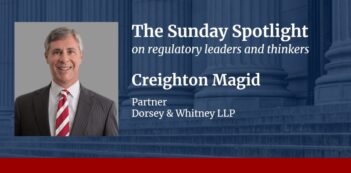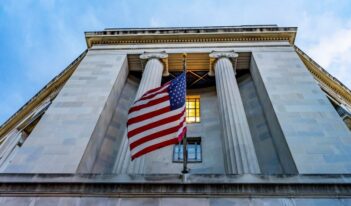
The repercussions of a recent Supreme Court decision could affect future trade regulations.
In AMG Capital Management, LLC v. Federal Trade Commission, the U.S. Supreme Court ruled that Section 13(b) of the Federal Trade Commission Act neither authorizes the agency to seek, nor the federal courts to award, “equitable monetary relief such as disgorgement or restitution.”
AMG shook the foundations of the Federal Trade Commission’s (FTC) law enforcement program, disabling a remedial tool that anchors the Commission’s prosecution of serious fraud and, increasingly, antitrust violations. Until Congress makes repairs—assuming it does—the agency must use weaker, clumsier measures to deprive wrongdoers of ill-gotten gains and deter misconduct.
AMG may have an equally significant aftershock in the years to come. Many observers have urged the FTC to promulgate trade regulation rules to bar anti-competitive practices.
One leading advocate of competition rulemaking is Lina Khan, who became the FTC’s Chair on June 15. Supported by fellow FTC Commissioners Rohit Chopra and Rebecca Kelly Slaughter, Chair Khan now has the votes to issue new competition rules that, among other ends, would ban covenants not to compete in employment contracts and prohibit exclusionary or discriminatory practices by large digital platforms. On July 9, President Joseph R. Biden gave a boost to the FTC’s competition rulemaking efforts by issuing the Executive Order on Promoting Competition in the American Economy. Section 5(g) of the Executive Order encourages the Commission to consider exercising its “statutory rulemaking authority” to address a variety of impediments to competition.
AMG confronts the FTC with a difficult question about the scope of its statutory authority to issue competition rules under Section 6(g) of the FTC Act. Section 6(g) allows the Commission “to make rules and regulations for the purpose of carrying out the provisions” of the FTC Act.
In 1973, in National Petroleum Refiners Association v. FTC, the U.S. Court of Appeals for the D.C. Circuit upheld an FTC rule that required petroleum retailers to post octane ratings on gasoline pumps. The D.C. Circuit concluded that Section 6(g) gave the agency authority to issue substantive competition rules that implemented the FTC’s power to proscribe “unfair methods of competition.” The court rejected the trade association’s argument that the provision merely authorized the Commission to issue procedural rules governing the performance of information-gathering duties and other administrative functions.
The Commission has not realized the possibilities created by Petroleum Refiners, though it considered—but did not issue—various competition rules in the mid to late 1970s. If the Khan Commission moves to issue competition rules, Petroleum Refiners would supply the necessary legal foundation. Some scholars, especially administrative law experts, regard the D.C. Circuit’s reasoning as unsupportable, but others view the decision as a sound basis for FTC to develop new competition rules.
AMG raises questions about whether Petroleum Refiners has passed its “best if used by” or expiry date. The Petroleum Refiners decision reflected a philosophy that welcomed efforts by regulatory agencies, often accused of being timid in the application of seemingly powerful mandates, to use their powers creatively and expansively. The D.C. Circuit in Petroleum Refiners displayed a willingness to infer competition rulemaking authority despite an ambiguous statutory text and seemingly hostile legislative history.
The Supreme Court’s attitude and methodology in AMG suggest that it might not be so generous to the Commission in future cases that challenged the agency’s competition rules.
In interpreting the FTC’s remedial powers under Section 13(b), the Court examined all provisions of the FTC Act dealing with the Commission’s remedial powers and concluded that Congress, in some provisions, said that the Commission could apply the full range of traditional equitable remedies, including monetary relief.
To the Court, these provisions contemplated that the Commission could obtain monetary remedies in federal court only after it had employed its administrative adjudication process to proscribe the conduct at issue under Section 5 of the FTC Act. Section 13(b) spoke only of injunctions.
The AMG Court declined to infer that the legislature’s choice of words in 13(b) encompassed monetary relief. The Court concluded that if Congress wanted to give the FTC a wider mandate, it could have said so in 13(b) by speaking of, say, injunctions and other equitable relief.
The Court dismissed the Commission’ arguments that Congress, in a series of amendments to the FTC Act, in effect had ratified lower court decisions that interpreted 13(b) to permit the agency to obtain monetary remedies in suits brought directly in the federal courts. The Court also brushed aside the agency’s plea that the ability to obtain monetary relief in suits brought directly in federal district court was vital to the effectiveness of the agency’s law enforcement program. The solution, the Court observed, resided in the halls of Congress, where proposals already are under consideration to amend the 13(b) text.
As it assesses AMG’s significance, the FTC cannot help but take account of the margin of its defeat. The vote overturning a $1.27 billion judgment against the corporate defendant was 9-0. By my count, this is the first time since 1931 that the Commission has been on the losing end of a shutout before the Supreme Court.
Justice Stephen Breyer, the Court’s foremost authority on administrative law, economic regulation, and the Federal Trade Commission, wrote the AMG opinion. Before AMG, Justice Breyer had voted in favor of the Commission in each of four cases in which the agency appeared as a party. Writing for the Court majority or in dissent, Justice Breyer’s earlier opinions have revealed respect for FTC as an institution, confidence in its capabilities, and trust in its professional judgment. Simply stated, Justice Breyer is the best friend the FTC has on the Supreme Court today, and none of the agency’s arguments persuaded him—or any of his colleagues.
AMG’s approach to statutory interpretation will confront the Commission if it returns to the Supreme Court to defend new competition rules promulgated under Section 6(g). The FTC will need to assess how much it can rely upon Petroleum Refiners in light of AMG.
It would be reasonable for the Commission to proceed with new competition rules premised on Section 6(g), but only after the agency considers the risks inherent in the language of 6(g), the uncertain contemporary vitality of Petroleum Refiners, and the hurdles that AMG arguably has placed in the way of future FTC efforts to apply powers inferred from ambiguous statutory text.
There is another way to realize Chair Khan’s vision for competition rules: Ask Congress for legislation to clarify the FTC’s authority. The clarification might be part of a package that includes a measure to close the 13(b) remedial gap exposed by AMG and to eliminate anachronistic exemptions from the agency’s jurisdiction, such as for common carriers, banks, certain activities of insurance providers, and not-for-profit institutions.
These measures arguably are necessary for the agency to perform the more ambitious program that Chair Khan and her colleagues intend to pursue, and to fulfill the role for the FTC that President Biden’s Executive Order sets out. In particular, a congressional grant of express authority would remove all possible doubts about the agency’s power to issue competition rules. It would also help shield the agency against possible future claims—such as ones by legislators speaking on behalf of commercial interests adversely affected by proposed rules—that the Commission has exceeded its authority.
Seeking the legislative clarification suggested here admittedly presents its own risks. Legislative deliberations over amendments to 13(b) or 6(g) could migrate into a larger discussion about the appropriate functions and powers of the FTC, including whether the Commission should continue in its multi-function policy role with responsibility for antitrust, consumer protection, and privacy.
Even seemingly narrow proposals to amend 13(b) and to clarify the agency’s competition rulemaking powers could lead Congress to conduct a basic re-examination of the agency and the rationale for its continued existence. It is also possible that such a re-examination may be coming with or without new legislative proposals. Some prominent legislators, such as Senator Mike Lee, openly have called for withdrawing the FTC’s existing competition policy mandate and consolidating all antitrust enforcement responsibility in the Department of Justice.
Congress seems inclined to return to first principles about the design of the U.S. competition policy system. As the FTC seeks reforms to cure gaps in its remedial powers and other aspects of its authority, the Commission must be ready to answer basic questions about its future role as a regulatory body.
This essay is part of a nine-part series, entitled The Supreme Court’s 2020-2021 Regulatory Term.




